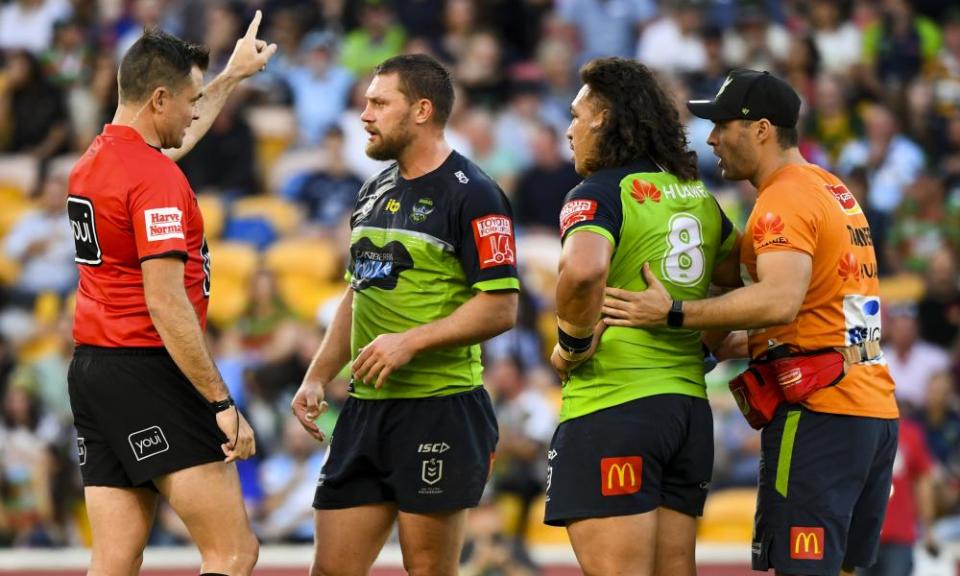NRL doesn’t need visceral violence of high tackles to be wildly entertaining

Following the Raiders’ compelling and potentially season-changing victory over Canterbury Bulldogs at Suncorp Stadium on Saturday afternoon, Canberra coach Ricky Stuart lamented the fact he wasn’t talking about it.
Rather Stuart was responding to reporters’ questions, as he knew he would be, on the merits of Josh Papalii’s send-off after the Canberra front-rower’s tackle connected with the head of the Canterbury winger Tui Katoa. Stuart, as reporters had likely anticipated, was not fully supportive of the dismissal.
“It’s sad we’re talking about it,” he said. “With the talking about it, we’re giving other sports a leg up – that’s not we are here for. We’ve got a wonderful weekend of rugby league and we want to promote our game. But unfortunately, we’re talking about the wrong things. But it has to be spoken about … the game’s changed.”
Related: Adam Reynolds understanding of South Sydney’s position as Broncos confirm signing
Stuart’s belief is that if the Papalii tackle is now the benchmark for a send-off, there will be a lot more send-offs. “If that’s going to be the precedent we’re going to find a completely different game of rugby league [to the one] we’ve been following for many years,” Stuart said.
Stuart’s opinion, as usual, has the game’s and his club’s best interests at heart. And as usual it was delivered in the emotive minutes post-match. Yet it’s a variation of one we’ve heard before. And effectively it comes down to fear of the unknown; of people making educated guesses about a future they cannot predict.
When the league stamped out punching and the shoulder-charge – and you could go back to 1983 when judiciary commissioner Jim Comans delivered season-plus sentences to Les Boyd and Bob Cooper – people warned that the “fabric” of rugby league would be changed forever. Even damaged.
“Is this what we want?” they asked then as they’re asking now. And the answer then and the answer now appears to be, largely, well, yes. Ratings, crowds and several other pertinent markers of the game’s health are bubbling along. There are no more punches, shoulder charges, spear tackling or eye gouging because players and coaches adapted. Do we miss those things? Some probably do a bit, but it cannot any longer be.
And of course the footy remains wildly entertaining without the visceral violence.
In a similar vein in the case of this edict, players will adapt to tackling lower than the head. Otherwise they will cop penalties – and here’s the kicker - even if they think it’s not their fault. Because it will be their fault. Hit the head, your fault. Don’t go high, don’t get penalised.
There will be cries of injustice but they will lessen as the new normal becomes the normal normal. Players and coaches will adapt and will train to keep tackles low – or at least lower than the neck, and even chest. Because if you aim “high” – let’s call it chest area – you’re taking a punt. If the attacker slips or falls or otherwise lowers the spot where his head was milliseconds prior to your tackle – and your tackle contacts his head – then that’s on you. You’re off, as Papalii, Tyrell Faimaono (Dragons) and Herman Ese’ese (Titans) found out.
There may be a fear that players, because they are clever and will adapt, will intentionally “fall” and wear high tackles. Defenders in the line fall over when a block play goes slightly wrong and they are obstructed. Divers in football’s 18-yard box are still a thing. Yet you assume it wouldn’t be milked too often given a player falling into a tackle on purpose risks concussion.
Regardless, the fact remains that Papalii missed, and it is his fault. He cocked his knees and bunched his burly shoulder and launched it at the runner; and pulled off an otherwise copy-book and aptly-named “hit”. Yet the point of his shoulder connected with Katoa’s jaw and jolted the man’s head. And that, in Peter V’landys’ NRL, cannot be.
Both Stuart and Papalii knew it. V’Landys had told them so two weeks ago and repeated the edict before this round. The difference was that this time the instruction went to the media, too, who helped make it real. And thus referees were further warned, too: make it happen, it is an edict. Jobs are on the line.
After Saturday’s game – ironically won by the Raiders who for several minutes had 11 men on the field – Stuart exclaimed: “Jesus, we’ve got a game that’s quite unique, but it’s not a game for everyone – it’s a tough, brutal contact sport. And if we want to take that away, let us know, I’ll start recruiting different types of players.”
Respectfully, it misses the point, which is the future prospects, even the existence, of the very game. Because however tough a player is, if their employer doesn’t offer suitable duty of care and that player develops complications in later life, then that player - and thousands like him – could sue rugby league for negligence.
And who’s going to want to play then?

 Yahoo Finance
Yahoo Finance 